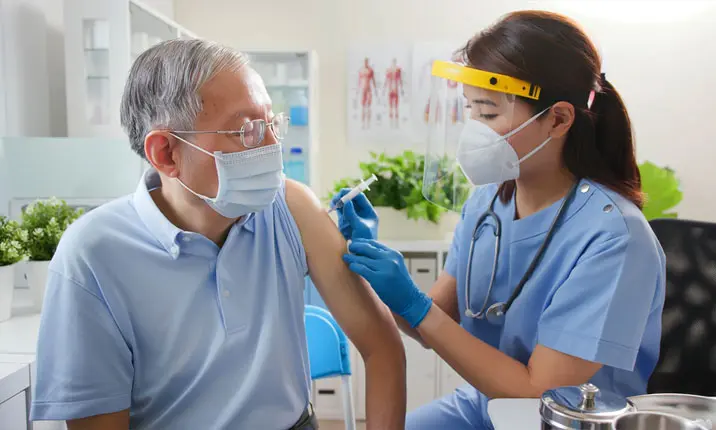The ongoing pandemic poses significant risks to those with a heart condition, as they are at increased risk of more severe complications if they do contract COVID-19. Relief has finally come in the form of vaccines, but apart from their efficacy, the question as to whether or not they're suitable for those afflicted with heart disease begs an answer.
The impact of COVID-19 on pre-existing heart conditions
When COVID-19 first came into the picture, it was thought to affect only the respiratory system. As medical authorities flocked to investigate, it became clear that while the virus first attacks the lungs and airways, the infection eventually makes its way to the cardiovascular system. Hence, people with pre-existing heart conditions are more vulnerable to the virus. Pre-existing heart conditions can include anything from coronary artery disease to heart failure.
What's more concerning is that heart disease typically affects older people; a pairing that may be fatal in the face of COVID-19. Senior citizens also tend to have more health issues, such as diabetes and high blood pressure.
This virus may bring about inflammation in the heart and cause heart attacks or cardiac arrest. Giving further credence to the link between heart disease and susceptibility to the virus, heart patients suffering from COVID-19 are 12 times as likely to succumb to the virus.
Can people with heart disease get vaccinated?
Several vaccines have been developed, distributed and administered around the world, from developed nations to developing countries. Some vaccines have been met with hesitation amid reports of blood clots. Articles drawing a link between vaccines and heart conditions have also been gaining traction, but these claims have been debunked by medical authorities.
The vaccine is safe to be administered to heart patients, with no established link between the vaccine's potential side effects and pre-existing heart conditions. Clinical trials have been conducted on patients with varying pre-existing health conditions, including hypertension, diabetes and high cholesterol. There have not been any reported side effects or complications found after the vaccines were administered on these patients.
Since the vaccine is deemed to be medically safe for heart patients, those with heart conditions are strongly recommended to get vaccinated once it becomes available to them. This can diminish their risk of contracting the COVID-19 virus, thereby protecting them against potential complications that may develop from having the virus.
The vaccine is safe for most individuals with pre-existing health conditions, except for patients with anaphylaxis that have a documented history of allergies or allergic reactions. Anaphylaxis is a rare life-threatening allergic reaction that may sometimes occur after vaccination, with onset usually occurring within minutes to hours. If someone is detected with anaphylaxis after the first dose, they will not be eligible for the second one.
Potential side effects of the COVID-19 vaccine
Potential side effects of the COVID-19 vaccine include slight pain and redness at or near the injection site. A low-grade fever is also common. Additionally, headaches, muscular pain, diarrhoea, and fatigue have also been reported.
It is pertinent to mention that side effects vary from person to person, but none of them last long. Serious side effects, while possible, are rare. One of the rare serious side effects reported is cerebral venous thrombosis (CVT), which is a type of blood clot in the brain. So far, this side effect has only been linked to the AstraZeneca vaccine.
Risk of myocarditis and pericarditis
More recently, among those administered with the mRNA COVID-19 vaccination (Pfizer-BioNTech and Moderna), there have been reports of myocarditis and pericarditis. Myocarditis is the inflammation of the heart muscles, while pericarditis is the inflammation of the tissue that covers the heart. The inflammation is usually caused by an infection, an autoimmune condition, radiation therapy and certain medications. In rare cases, this inflammation may also be caused by vaccines. The symptoms of this inflammation include sudden chest pain, shortness of breath, and palpitations.
Most of the patients who developed heart inflammation after the COVID-19 vaccinations are young (less than 30 years old) and predominantly male. Majority of the cases occur a few days after they've received the second dose of the vaccine. These cases are often mild, with patients recovering within a week after the onset of symptoms. The risk of heart inflammation from COVID-19 vaccination is low – the Centers for Disease Control and Prevention (CDC) shared that for every 1 million doses of COVID-19 vaccine, there have been 67 reported cases in males aged 12 – 17, 56 cases in males aged 18 – 24, and 20 cases in males aged 25 – 29.
While there appears to be strong evidence of a link between the vaccines and heart inflammation, health authorities have yet to establish an actual causal relationship. As of this writing, experts are still investigating how the vaccines contribute to myocarditis and pericarditis. In the meantime, we recommend taking precautions such as avoiding strenuous exercises within 1 week of vaccination.
The incidence of acute myocarditis and pericarditis is low, with the benefits of COVID-19 vaccination outweighing the risks. COVID-19 infection can also cause myocarditis, presenting a relatively higher risk to patients. With the emergence of new COVID-19 variants that appear to spread more quickly, it is advisable to protect ourselves by getting vaccinated. So far, COVID-19 vaccines have been shown to provide protection against these variants, with majority of current hospitalisations and deaths observed among those who have not been vaccinated.
Consult a heart specialist if in doubt
If you have a pre-existing heart condition and are still unsure about getting the COVID-19 vaccination, consider seeing a cardiologist to have your concerns addressed. Your doctor will be able to assess your health and help you determine if you are fit to receive the COVID-19 vaccine.














